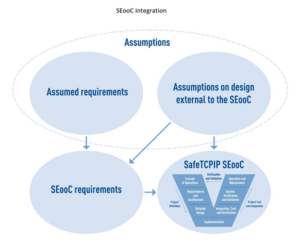HCC Embedded (HCC) has introduced the first element in the Safety Elements out of Context (SEooC) approach to developing reusable software components that can be integrated with systems engineered to meet stringent requirements for safety, quality, and portability. HCC has created the processes and environment to build reusable SEooCs and today introduced its first Element: the HCC SafeTCPIP network stack for use in automotive systems. Future releases will map the standard ISO26262 V-model process to other safety-critical standards such as in aerospace, industrial, and medical device markets.
 Originating in ISO 26262-10, SEooC is defined as a method for using software or hardware components in a vehicle that were not originally designed for that specific project. A software SEooC is developed to a safety standard, in this case ISO 26262, which means that it is developed with all the processes of a full software safety lifecycle and within the design constraints of a safety system. The software components are developed “out of context” to provide a specific function with no awareness of how the component will be used in the target system. The “Element” indicates that this is a unit or module with a specific range of functionality; “safety” indicates that this module is specifically developed in the context of a set of safety requirements. HCC is the first embedded software module vendor to use the SEooC approach to build commercial software Elements, beginning with its SafeTCPIP product.
Originating in ISO 26262-10, SEooC is defined as a method for using software or hardware components in a vehicle that were not originally designed for that specific project. A software SEooC is developed to a safety standard, in this case ISO 26262, which means that it is developed with all the processes of a full software safety lifecycle and within the design constraints of a safety system. The software components are developed “out of context” to provide a specific function with no awareness of how the component will be used in the target system. The “Element” indicates that this is a unit or module with a specific range of functionality; “safety” indicates that this module is specifically developed in the context of a set of safety requirements. HCC is the first embedded software module vendor to use the SEooC approach to build commercial software Elements, beginning with its SafeTCPIP product.
Automotive software developers may require a TCP/IP stack to be integrated into a safety product to guarantee the quality of the networking or to allow it to be used in a safety environment for a supporting, non-safety-critical role such as diagnostics. The defacto network standard for connected cars and in-vehicle safety systems is TCP/IP, but commercially available products are rarely developed to meet safety standards, are only partially certified, or are tightly integrated to a single vendor’s development system and RTOS.
HCC’s SafeTCPIP is a complete TCP/IPv4 network stack developed to the ISO 26262 Automotive Safety Integrity Level (ASIL) B standard. HCC’s SafeTCPIP Element fills a critical market need by giving automotive OEMs and suppliers an off-the-shelf solution that has been independently designed to satisfy TCP/IP networking requirements. The reusability of the TCP/IP stack contributes to long-term stability and reduces development costs.
Critical to the success of this approach, HCC’s SafeTCPIP Element is developed to full ISO 26262 Section 6 processes for integration with automotive systems that require a high safety-integrity level and is supported by an independent software lifecycle for maintenance. The exact verified product that is integrated can be maintained and modified to safety standards independent of any other project that integrates SafeTCPIP. Because it is developed as a SEooC, the Element can be integrated with the company’s other safety development lifecycle.


Leave a Reply
You must be logged in to post a comment.